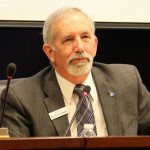A proposal to launch a rural schools center may be lacking in details, House Education Committee Chairman Reed DeMordaunt told the Legislature’s joint budget committee Tuesday.
Superintendent of Public Instruction Sherri Ybarra proposed the rural schools center earlier this year, and is asking lawmakers for $300,000 for the launch.
Ybarra says the center would be designed to help smaller and geographically isolated school districts compete with Idaho’s larger districts. The center would offer resources, personnel and support that small districts may not otherwise be able to afford.
The rural schools center is a significant piece of Ybarra’s budget that is not funded under Gov. Butch Otter’s K-12 proposal.

DeMordaunt briefed the Joint Finance-Appropriations Committee on his committee’s budget and policy priorities for the year. DeMordaunt pointed out that “there is interest from my committee” in the rural center, but the proposal may not be fully developed.
“Again, I applaud (Ybarra) for her efforts to think about how we can do a better job helping the many small school districts in our state,” DeMordaunt said. “As I’ve looked at the legislation, I believe that we need a few more details there, but I applaud the concept. If we can get some details fleshed out there is definitely merit to that, but I do see that we’re missing a few details at this point in time.”
In preparation for setting the school budget, Rep. Wendy Horman, a JFAC member, said she asked Ybarra’s office last week for details about the rural schools proposal, and was told “none were available.”
DeMordaunt said he reviewed a rural schools center draft bill for the first time Monday.
“I believe it made some good steps, but I do believe it was, perhaps, lacking in some details there,” DeMordaunt said.
DeMordaunt didn’t specify what details he found lacking.
The draft bill has so far not been brought before House Education, and is not on the committee’s Wednesday agenda.
DeMordaunt told JFAC that House Education’s top budgetary priorities are to increase teacher pay, through the second year of the career ladder salary law, and to reverse recession-era cuts to discretionary funding sent to school districts.
Beyond that, he said, support for literacy proposals designed to improve struggling readers’ skills “jumps to the top of the (priority) list.” His committee supports increased funding for classroom technology and a proposal to upgrade Eastern Idaho Technical College to a community college.
He also threw his committee’s support behind plans to strengthen college and career counseling.
On Wednesday, DeMordaunt’s Senate counterpart will have his turn addressing JFAC. On Tuesday afternoon, Senate Education Committee Chairman Dean Mortimer quizzed his committee about their spending priorities.
Committee members voiced strong support for two top priorities: the second year of the career ladder and restoring discretionary spending. Beyond that, committee members had a few favorites, including college and career mentoring, classroom technology and literacy programs. But the committee’s prevailing sentiment may well have been captured by Sen. Janie Ward-Engelking, D-Boise: “I want it all.”
In other Statehouse action Tuesday:
Teacher and principal evaluations. House Education introduced a bill to push back the deadline to complete evaluations by one month.

Pushed by Rep. Caroline Nilsson Troy and the Idaho School Boards Association, the bill would move the deadline from May 1 to June 1.
Troy said the move would allow educators and evaluators to receive Idaho Standards Achievement Test 2.0 by Smarter Balanced (SBAC) results in time to use them in evaluations.
“Evaluations are required to contain an element of test scores. However, test scores do not arrive prior to May 1,” Troy said.
The bill says evaluations must be completed prior to issuing annual teacher contracts. If test scores are still not available prior to June 1, other objective measures, approved by the State Board of Education, would be used instead.
Evaluations have become an increasingly controversial subject. The new career ladder law links teacher pay raises to evaluation scores.
In June, Idaho Education News reported that administrators in 32 school districts submitted identical overall evaluation scores to every district teacher. Superintendents said many school districts submitted inaccurate evaluation scores in an effort to protect teachers’ privacy.
The committee introduced the bill with very little discussion, but it is expected to return to House Education for a full hearing.
STEM fund. A bill creating a long-term STEM endowment received unanimous backing from the Senate Education Committee — and even received a pledge.
The STEM Education Fund is designed to provide state dollars to support programs in the STEM disciplines of science, technology, engineering and math. Supporters say the fund is needed to attract matching industry donations for STEM programs.
“It shows that the state has a serious interest in funding STEM education,” said Angela Hemingway, executive director of the state’s STEM Action Center.
Senate Bill 1279 doesn’t put any money into the fund; that decision falls to legislative budget-writers. Gov. Butch Otter has proposed putting $10 million into the fund, with the first $2 million going to support a computer science initiative.

Established last summer, the STEM Action Center has collected $28,000 in industry donations, Hemingway told senators. That prompted Mortimer to admonish industry to support the fledgling action center.
Mortimer followed up by extending an olive branch.
After Tuesday’s vote to send SB 1279 to the Senate floor, Mortimer promised he would make the first donation to the STEM fund — if the proposal becomes law.
School safety. House Education introduced a bill to establish a new Office of School Safety and Security.

Horman pushed the bill, saying it represents a proactive measure to improve safety and security. Horman said the initiative is rooted in safety audits conducted at school districts over the past three years following a December 2012 school shooting in Newtown, Conn.
Horman said she originally planned to work on developing the proposal over the next year, but expedited her efforts in light of additional mass shootings in Oregon, California and elsewhere in 2015.
“I realized there is more we can do and we needed to do it now,” Horman said.
Under Horman’s bill, an Office of School Safety and Security would be housed under the state Division of Building Safety, which already completes annual school inspections. The new office would provide educators with security assessments and training and identify areas of vulnerability.
A 2014 school safety audit conducted by contractors from Educators Eyes found unauthorized adults were able to enter 71 of the 74 Idaho schools studied. Once inside, unauthorized adults were not approached by a school representative for an average of nine minutes and 43 seconds.
The bill is expected to return to the committee for a full hearing.
Idaho Education News staff writer Kevin Richert contributed to this report.
